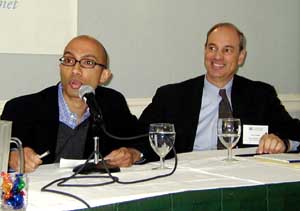-
- GLBT liaison murdered in Washington, D.C.
- California ruling intensifies state debates over same-sex marriage
- McKinney mum on support for lifting ‘Don’t Ask, Don’t Tell’ ban
- Judge’s same-sex marriage ruling poises California for constitutional fight
- The political state of GLBT health
- National News Briefs
- World News Briefs
national
The political state of GLBT health
Bush administration calls for abstinence education, further HIV/AIDS funding cuts
Published Thursday, 24-Mar-2005 in issue 900
The breadth of challenges on issues of GLBT health posed by the Bush administration and Congress were laid out at the spring meeting of the National Coalition for LGBT Health in Washington, D.C., on March 14. Money is tighter than ever and social conservatives are relentless in trying to impose their moral vision upon the rest of the country, they said.
Social conservative Claude Allen has moved from the number-two position at the Department of Health and Human Services (HHS) to be domestic policy adviser at the White House. “That is going to present some very big challenges for us over the next four years,” said Carl Schmidt, a lobbyist for The AIDS Institute.
Praveen Fernandes, a lobbyist with the Human Rights Campaign, tried to look at the bright side of the move – it means that Allen is no longer a nominee for a lifetime appointment as a federal judge to the Fourth Circuit Court of Appeals. “Domestic policy adviser is not a lifetime appointment,” he said.
There is some hope that the new HHS secretary, Michael Leavitt, might not be so bad. They noted that he vetoed a piece of anti-gay legislation when he was governor of Utah. The number-two position at HHS is vacant and the eventual nominee will be closely scrutinized.
Schmidt was encouraged by the lack of comment from the administration on the controversy that erupted in New York over a possible “super-strain” of HIV. He worries that the five-year reauthorization of the National Institutes of Health might be used to cut AIDS research funding by those who have argued that AIDS is getting too much money.
Ryan White AIDS services legislation also is up for renewal. “It is the only moving vehicle for domestic HIV/AIDS legislation. It could become a Christmas tree” for social restrictions on prevention activities such as abstinence only programs, Schmidt said. “We are working hard as a coalition to make sure that this remains a care and treatment bill and not get bogged down with divisive social amendments.”
“I have seen no retreat at all by the administration on abstinence-only programs,” he continued. The president’s budget proposes $206 million for them – an increase of $39 million, even while the CDC HIV-prevention budget is being cut by $4 million.
He noted an interesting evolution of the Bush administration’s language in public discourse over support for abstinence programs. The initial phrase was “abstinence only until marriage.” First to go was the “until marriage” and now they are saying just “abstinence,” but that does not change their intent as embodied in the full phrase.
“They are getting away with a lot by just using the word abstinence,” Schmidt said. “We have to call it for what it is. We always have to come back and say ‘abstinence only until marriage’ and get into the aspect of it that gay people can’t get married.”
“I think there is going to be a battle about whether they are effective… and dangerous misinformation, not just about the LGBT community and the transmission of STDs [sexually transmitted diseases] but about Victorian” morality, Fernandes said.
Progressive groups are working to support an amendment by Senators Max Baucus, D-Mont., and Lincoln Chafee, R-R.I., to allow states to have the flexibility to use abstinence funding as part of an overall program of sexual education – an “abstinence-plus” approach. It likely will be offered on the floor of the Senate.
Fernandes called the tactic “a stealth approach” because they do not have the political strength to directly take on abstinence supporters. The Real Education About Life (REAL) Act would create the first funding stream for comprehensive sex education programs. While it likely will not pass, it does affect the debate on these issues.
Kara Suffredini, a lobbyist with the National Gay and Lesbian Task Force, said their recently expanded department will devote a lot of their efforts to health issues. “We are trying to figure out what kinds of viable federal legislation we can introduce,” she said.
Social conservatives “went ballistic” when Bush indicated in a newspaper interview that he did not intend to push the anti-gay Marriage Protection Amendment to the U.S. Constitution, Schmidt said. “It just shows how strong the right wing is in the Republican Party…. If they don’t get 100 percent [of what they want], they speak loudly.”
Fernandes said that systemic issues such as Medicaid cuts have a profound effect on the GLBT health agenda. When it is cut, people who are getting their AIDS medications through Medicaid then have to go to already over-burdened ADAP programs, he said.
Gays and lesbians are twice as likely not to have health insurance, added David Haltiwanger with the Chase-Brexton Clinic in Baltimore, citing recent survey data to support his statement. “As a community, we are twice as dependent on those federally funded points of access” such as Medicaid and community health centers, as are most Americans, he said.
“This goes against the stereotype that many people have of our community as being wealthier than average…. When I put that out at meetings, people who are only slightly paying attention really perk up.”
|
|
Copyright © 2003-2025 Uptown Publications


